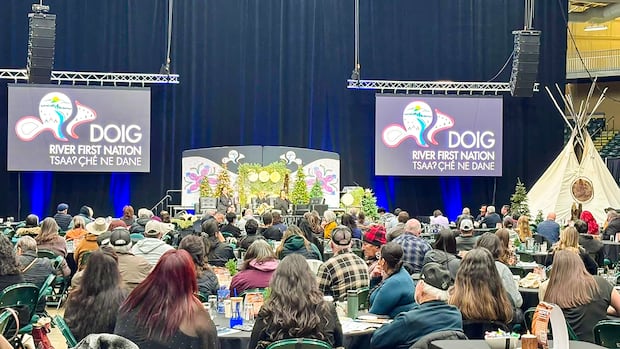British Columbia·NewThe proposal was a focus of Doig River First Nation’s Walking the Path of Justice conference last week — where leaders, elders, lawyers and judges from across the province and country gathered to talk about reform in the region.Nine Indigenous sentencing courts already operating in B.C.Matt Preprost · CBC News · Posted: Nov 24, 2025 6:18 PM EST | Last Updated: 12 minutes agoListen to this articleEstimated 4 minutesThe audio version of this article is generated by text-to-speech, a technology based on artificial intelligence.First Nation leaders, elders, lawyers and judges from across the province and country gathered in Dawson Creek Nov. 19 to 21 to talk about justice reforms in northeast B.C. (Dan Davies)Work is underway to establish an Indigenous sentencing court in Fort St. John, a move First Nation leaders and lawyers say could make for healthier communities in northeastern B.C.The proposal was a focus of Doig River First Nation’s Walking the Path of Justice conference last week — where leaders, elders, lawyers and judges from across the province and country gathered in Dawson Creek to talk about reform in the region.It comes as Indigenous people remain vastly overrepresented in B.C. jails. “There’s a failure there in the justice system and it’s got to do with trauma,” said Trevor Makadahay, outgoing chief of Doig River First Nation, which is leading efforts to create the new court. “It just doesn’t work for our people.”Statistics from B.C. Corrections show Indigenous people make up 36 per cent those in provincial custody, despite representing just six per cent of B.C.’s adult population.Makadahay links much of that to generations of unresolved trauma. He says Indigenous people often leave custody or cycle through court appearances without the proper supports to address what’s driving their behaviour.“Our people are definitely turning the wrong way somewhere. So how do we fix that?” he said. “It’s important for all the nations to get together and figure this out together.”LISTEN | Doig River First Nation plans Indigenous court in Fort St. John:Radio West4:53Doig River First Nation discussing justice reform at Indigenous court conference in Dawson CreekBrittany Robertson, Doig River band councillor, discusses why her community is looking for Indigenous justice reform within the court system.Makadahay says an indigenous court would offer a more culturally grounded and restorative approach to sentencing — connecting offenders with elders, cultural counselling, and land-based healing. He says that can take pressure off the traditional court system.”Our traditional knowledge and how we govern ourselves from the past … there needs to be a touch of that in the court system,” he said. “We actually can get down to the root of the problems,” he added. “It’ll help them integrate into society a lot better”WATCH | How Tofino is rethinking justice with an Indigenous focus:Tofino, B.C., rethinks court system with an Indigenous focus A former residential school building in Tofino, B.C., has become a courthouse that’s doing justice differently. The goal is to make court processes less intimidating and more in tune with Indigenous traditions. Terrace-based lawyer Graham Kay has spent 14 years working with Indigenous courts in B.C., and has helped develop six of the nine currently operating in the province.Kay says Indigenous courts typically handle sentencing for offences where jail sentences would be two years or lesser — which could range from something as minor as a probation breach, to something more serious like a first-time aggravated assault.“When I work in [places] that don’t have Indigenous courts, I see people continue to struggle,” he said. “The traditional court has not incorporated Indigenous ways of assisting people who are going through various types of trauma.”Kay says people sentenced in traditional courts are often left to navigate jail or probation on their own. In Indigenous courts, on the other hand, elders and justice partners stay actively involved, reviewing progress throughout a person’s sentence.That helps create better continuity in their rehabilitation, Kay said.“The Indigenous court process, while not perfect, certainly is a major contributor to being able to find a healing path,” he said. “More often than not, we’re seeing that they’re not coming back before the judicial system.”The first Indigenous court in B.C. opened in New Westminster in 2006, the latest in Lillooet in 2023. Kay believes a court in Fort St. John will lead to healthier communities, and said the proposal is part of the broader response to the Truth and Reconciliation Commission’s calls to action.“Indigenous courts are one step toward reconciliation,” he said. “We have to make a commitment to do that. Not just saying something. We actually have to do the action.”ABOUT THE AUTHORMatt Preprost is a reporter with CBC British Columbia based in Fort St. John, covering stories focused on the Peace Region and Northern Rockies. Email him at mathew.preprost@cbc.ca
New Indigenous court planned in Fort St. John











